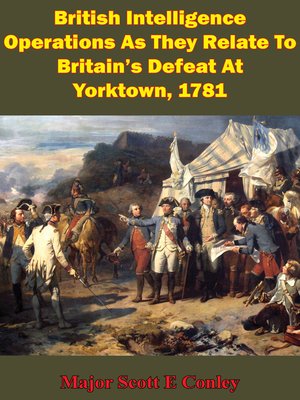British Intelligence Operations as They Relate to Britain's Defeat at Yorktown
ebook ∣ 1781
By Major Scott E. Conley

Sign up to save your library
With an OverDrive account, you can save your favorite libraries for at-a-glance information about availability. Find out more about OverDrive accounts.
Find this title in Libby, the library reading app by OverDrive.



Search for a digital library with this title
Title found at these libraries:
| Library Name | Distance |
|---|---|
| Loading... |
This paper examines the role of British intelligence operations during the American Revolutionary War as they apply to the British defeat at Yorktown. It begins with a brief history of British intelligence prior to the war, discusses strategic collection against the burgeoning French-American alliance, examines preconceptions during the planning of the southern campaign, and analyses the tactical intelligence operations of Lord Charles Cornwallis' army from the British victory at Charleston in 1780, through the defeat at Yorktown in 1781. It concludes that at the strategic level British intelligence accurately monitored French assistance to the Americans but had difficulty using the information to effect meaningful action on the American continent. At the operational level, General Sir Henry Clinton developed an accurate, reliable intelligence system in the northern colonies but was unable to transfer those successes to the southern theater. At the tactical level, General Cornwallis suffered from initial misconception about the degree of loyalist support in the South, lacked a general knowledge of the physical terrain in the southern colonies and failed to conduct proactive, deep reconnaissance during operations.







